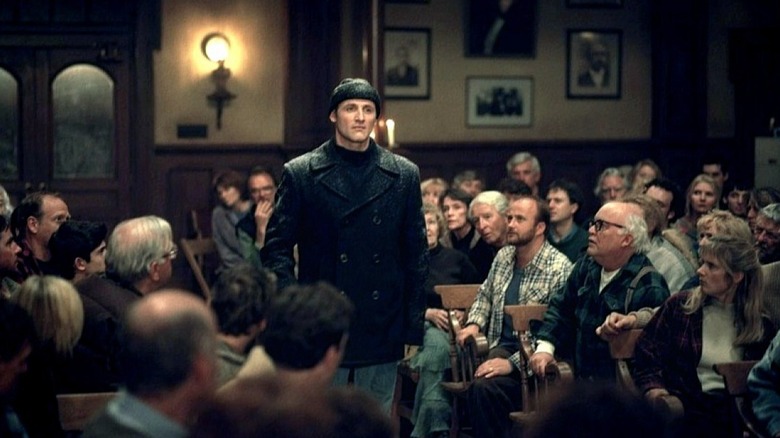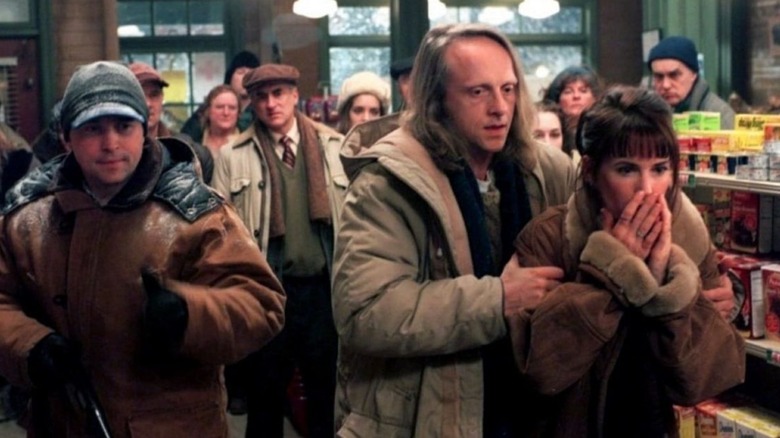The Miniseries Stephen King Considers His Favorite Is A Hidden Horror Treasure
This post contains spoilers for "Storm of the Century."
If you have never heard of "Storm of the Century," or don't remember it being a part of Stephen King's vast literary oeuvre, that's because it is not a book. When he's not involved with film or television adaptations of his works, King often writes original screenplays that indulge his most experimental narrative impulses. In most cases, these projects are adaptations of his own books (such as the faithful, eccentric miniseries version of "The Shining"), but "Storm of the Century" isn't based on existing works, as King wrote it solely for television. In fact, the screenplay was sold as a mass-market paperback right before the ABC series aired in February 1999, which helped shine a spotlight on this massively overlooked miniseries helmed by Craig R. Baxley ("The Triangle," "Rose Red").
So, what's the series about? The people of Little Tall Island are accustomed to local storms, but seem somewhat unprepared for a powerful blizzard, which folks are calling ... the Storm of the Century. To make matters worse, an elderly resident gets brutally murdered, and further investigation reveals that the murderer in question is a mysterious stranger. This man, André Linoge, makes no attempts to escape — instead, he lets himself get arrested, and starts spilling unsavory secrets about the townsfolk while expecting something cryptic from them in return. By the time we realize that Linoge is more than just a man, Little Tall Island descends into chaos, with the impending storm completely destabilizing the small-town community from within.
There are echoes of themes that King is best known for exploring, such as the sudden exposé of a seemingly idyllic town and the presence of a man who defies the laws of nature and established society. But "Storm of the Century" feels more philosophical than the average King tale, as it dives deeper into the complexity of innocence lost, along with the illusion of choice life presents us with. As a result, King is somewhat partial to "Storm of the Century," and he explains why in an interview with the Los Angeles Review of Books. Here's what the author had to say.
Storm of the Century plays a bit like King's Greatest Hits, but that's okay
In the interview linked above, King spoke at length about being involved with a wide range of film and television adaptations, while explaining why the visual medium is often preferred over all else. While talking about bringing his stories to life on the big (and small) screen, King touched upon the "Under the Dome" series, and why its three-season run wasn't as impactful as the showrunners had expected. King argued that some stories are best fleshed out in novelistic form, where "character, theme, development, [and] the arc of the narrative" do all the heavy lifting in a way the inner workings of the visual medium cannot. That said, he admitted that some stories were able to bypass these limitations and become successful, such as "Creepshow" and "Storm of the Century:"
"I've written some movies, and 'Creepshow' was a success. Some of the other ones have not been successful. The things that I like best are the miniseries, the things that run two or three, or four parts. My favorite thing of mine is 'Storm of the Century', which I thought really succeeded. It's very much like a Friedrich Dürrenmatt play called 'The Visit.' I just loved the way that turned out."
The fact that King compared the miniseries to Dürrenmatt's "The Visit" is not far-fetched at all, as the 1956 tragicomic play also features the homecoming of an eccentric figure, who forces the townspeople into an unsavory bargain. While the play is more darkly absurdist, King's miniseries draws liberally from his previous works, weaving in Gothic elements with a grounded sense of suspense. For those well-versed with King's most famous novels, "Storm of the Century" might feel like more of the same. However, if you look past these thematic rehashings, we have a compelling morality play that is both thrilling and horrifying, elevated by well-acted performances that help sell the delightfully odd premise.
While King's original screenplay is obviously top-notch, we must give credit to Baxley's taut direction, as he avoids leaning too much into a CGI-heavy spectacle to translate the more esoteric aspects of the story. These macabre elements are only reserved for climactic moments, which works in favor of a story that utilizes the extremes of human folly to drive its primary conflict. Although "Storm of the Century" remains mostly forgotten, its latent influence can still be felt, especially in Mike Flanagan's "Midnight Mass," which reinvents the morality play structure in the most deliciously gruesome ways.
"Storm of the Century" is currently streaming on Hulu.

